Organisational Behaviour: BBC Report on Culture, Teams & Motivation
VerifiedAdded on 2021/02/18
|13
|4252
|32
Report
AI Summary
This report delves into the intricacies of organisational behaviour within the British Broadcasting Company (BBC). It begins by examining the influence of organisational culture, power dynamics, and politics on employee behaviour, exploring various forms of power like coercive, reward, legitimate, referent, and expert power, and contrasting different cultural typologies such as power, task, person, and role cultures. The report further investigates content and process theories of motivation, including Maslow's hierarchy of needs and Vroom's expectancy theory, to improve individual performance. It then analyses different types of teams and strategies for enhancing their effectiveness. Finally, the report explores the path-goal theory of leadership and identifies potential barriers to effective performance. The conclusion synthesizes these findings, providing insights into the application of organisational behaviour principles within the BBC context.
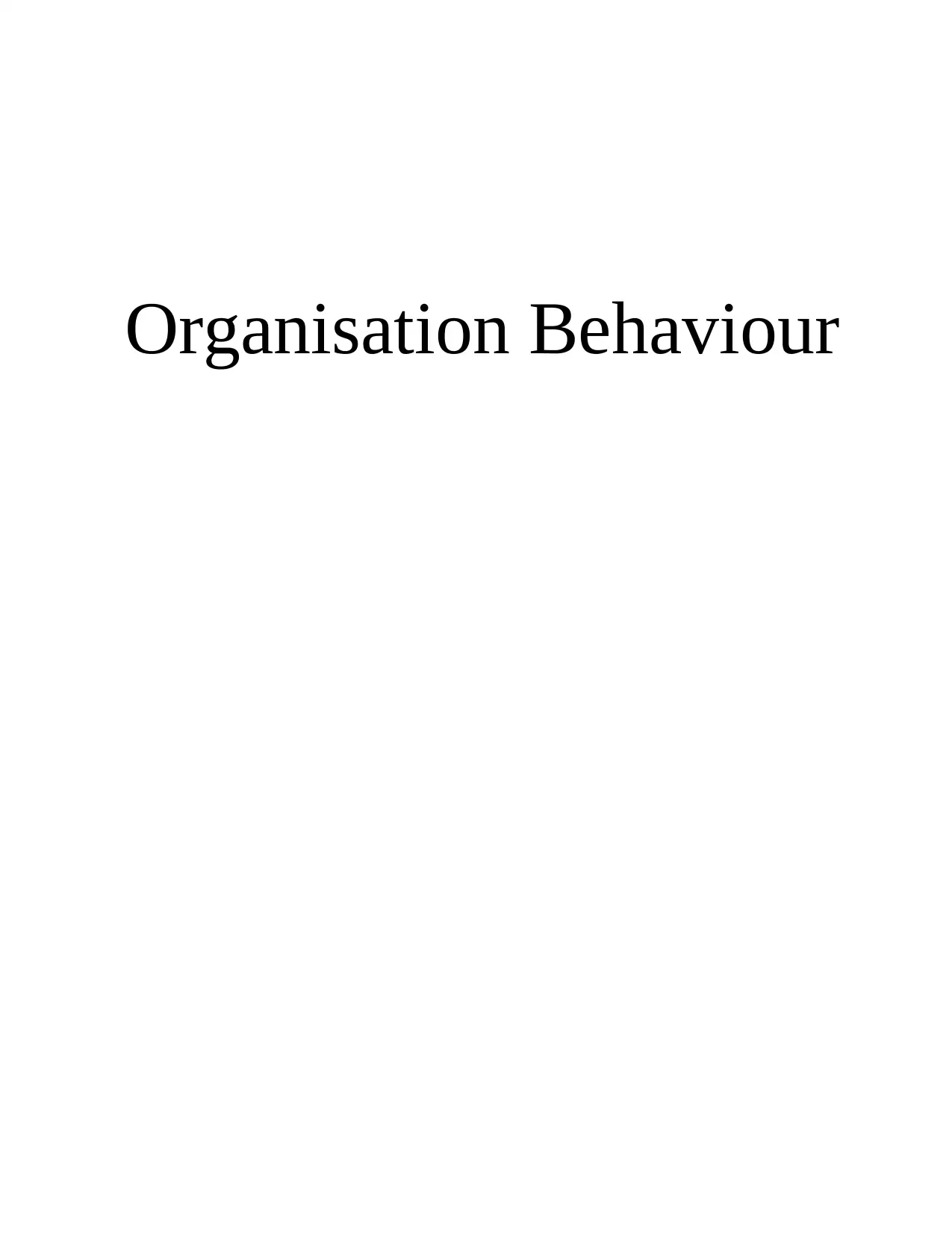
Organisation Behaviour
Paraphrase This Document
Need a fresh take? Get an instant paraphrase of this document with our AI Paraphraser
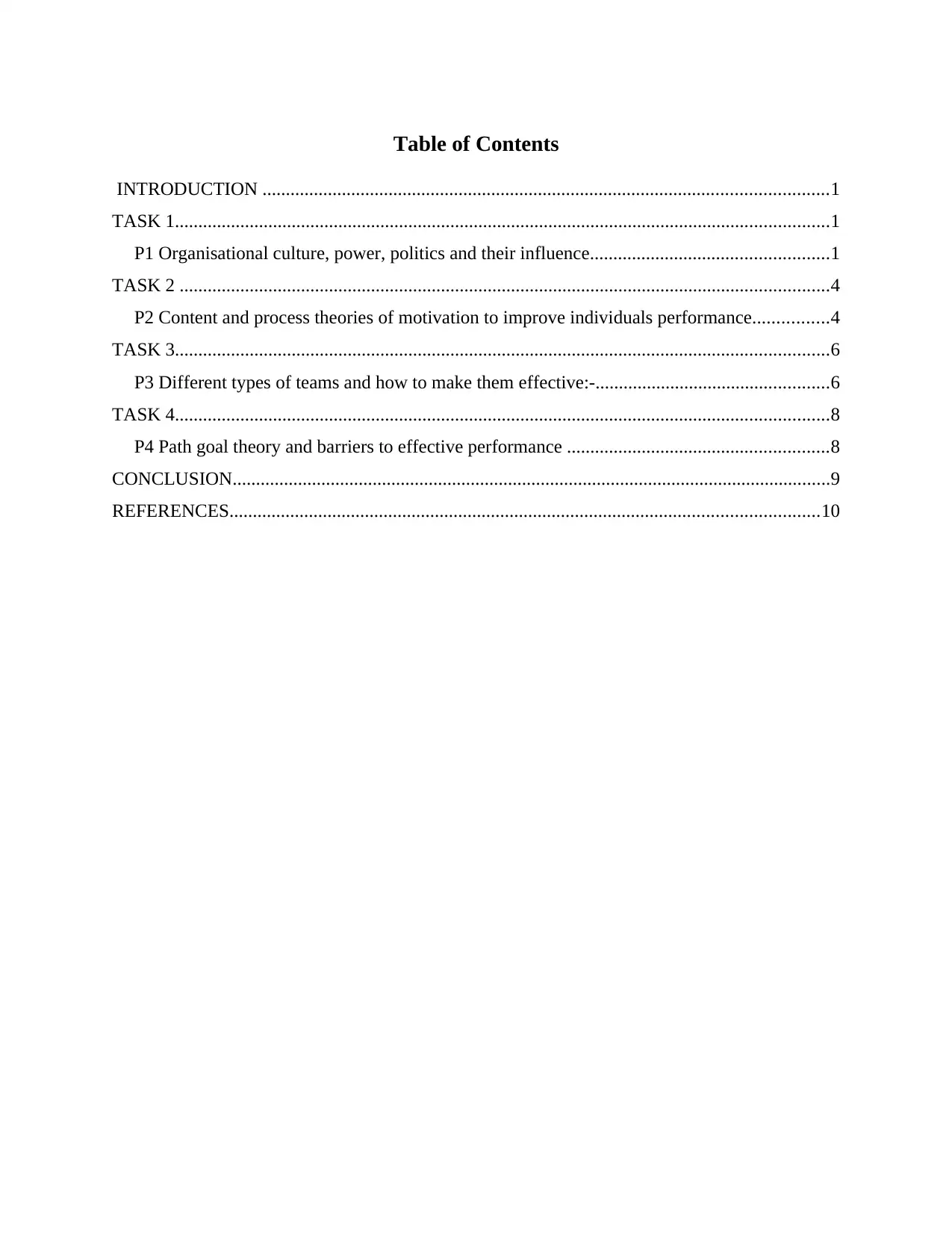
Table of Contents
INTRODUCTION .........................................................................................................................1
TASK 1............................................................................................................................................1
P1 Organisational culture, power, politics and their influence...................................................1
TASK 2 ...........................................................................................................................................4
P2 Content and process theories of motivation to improve individuals performance................4
TASK 3............................................................................................................................................6
P3 Different types of teams and how to make them effective:-..................................................6
TASK 4............................................................................................................................................8
P4 Path goal theory and barriers to effective performance ........................................................8
CONCLUSION................................................................................................................................9
REFERENCES..............................................................................................................................10
INTRODUCTION .........................................................................................................................1
TASK 1............................................................................................................................................1
P1 Organisational culture, power, politics and their influence...................................................1
TASK 2 ...........................................................................................................................................4
P2 Content and process theories of motivation to improve individuals performance................4
TASK 3............................................................................................................................................6
P3 Different types of teams and how to make them effective:-..................................................6
TASK 4............................................................................................................................................8
P4 Path goal theory and barriers to effective performance ........................................................8
CONCLUSION................................................................................................................................9
REFERENCES..............................................................................................................................10

⊘ This is a preview!⊘
Do you want full access?
Subscribe today to unlock all pages.

Trusted by 1+ million students worldwide
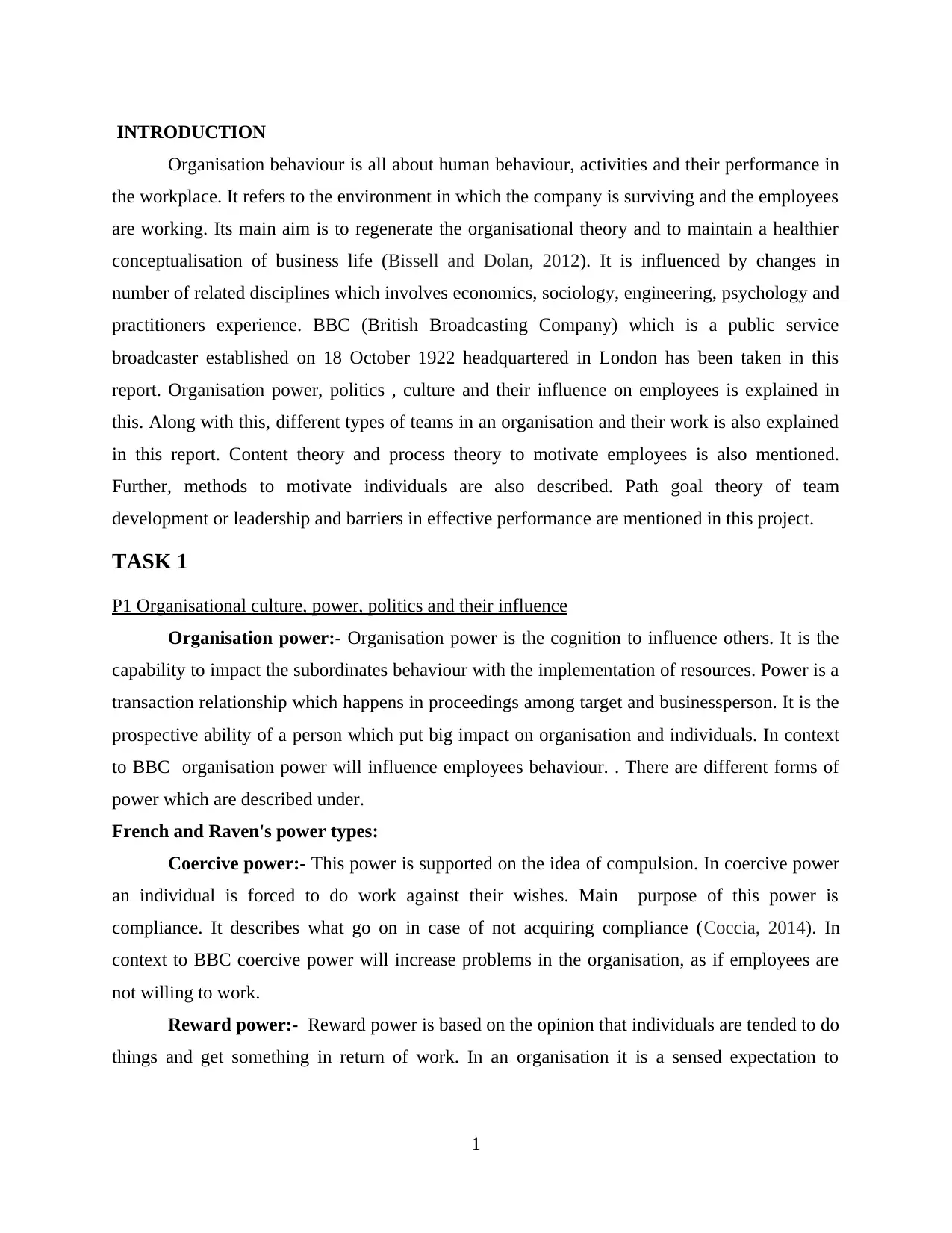
INTRODUCTION
Organisation behaviour is all about human behaviour, activities and their performance in
the workplace. It refers to the environment in which the company is surviving and the employees
are working. Its main aim is to regenerate the organisational theory and to maintain a healthier
conceptualisation of business life (Bissell and Dolan, 2012). It is influenced by changes in
number of related disciplines which involves economics, sociology, engineering, psychology and
practitioners experience. BBC (British Broadcasting Company) which is a public service
broadcaster established on 18 October 1922 headquartered in London has been taken in this
report. Organisation power, politics , culture and their influence on employees is explained in
this. Along with this, different types of teams in an organisation and their work is also explained
in this report. Content theory and process theory to motivate employees is also mentioned.
Further, methods to motivate individuals are also described. Path goal theory of team
development or leadership and barriers in effective performance are mentioned in this project.
TASK 1
P1 Organisational culture, power, politics and their influence
Organisation power:- Organisation power is the cognition to influence others. It is the
capability to impact the subordinates behaviour with the implementation of resources. Power is a
transaction relationship which happens in proceedings among target and businessperson. It is the
prospective ability of a person which put big impact on organisation and individuals. In context
to BBC organisation power will influence employees behaviour. . There are different forms of
power which are described under.
French and Raven's power types:
Coercive power:- This power is supported on the idea of compulsion. In coercive power
an individual is forced to do work against their wishes. Main purpose of this power is
compliance. It describes what go on in case of not acquiring compliance (Coccia, 2014). In
context to BBC coercive power will increase problems in the organisation, as if employees are
not willing to work.
Reward power:- Reward power is based on the opinion that individuals are tended to do
things and get something in return of work. In an organisation it is a sensed expectation to
1
Organisation behaviour is all about human behaviour, activities and their performance in
the workplace. It refers to the environment in which the company is surviving and the employees
are working. Its main aim is to regenerate the organisational theory and to maintain a healthier
conceptualisation of business life (Bissell and Dolan, 2012). It is influenced by changes in
number of related disciplines which involves economics, sociology, engineering, psychology and
practitioners experience. BBC (British Broadcasting Company) which is a public service
broadcaster established on 18 October 1922 headquartered in London has been taken in this
report. Organisation power, politics , culture and their influence on employees is explained in
this. Along with this, different types of teams in an organisation and their work is also explained
in this report. Content theory and process theory to motivate employees is also mentioned.
Further, methods to motivate individuals are also described. Path goal theory of team
development or leadership and barriers in effective performance are mentioned in this project.
TASK 1
P1 Organisational culture, power, politics and their influence
Organisation power:- Organisation power is the cognition to influence others. It is the
capability to impact the subordinates behaviour with the implementation of resources. Power is a
transaction relationship which happens in proceedings among target and businessperson. It is the
prospective ability of a person which put big impact on organisation and individuals. In context
to BBC organisation power will influence employees behaviour. . There are different forms of
power which are described under.
French and Raven's power types:
Coercive power:- This power is supported on the idea of compulsion. In coercive power
an individual is forced to do work against their wishes. Main purpose of this power is
compliance. It describes what go on in case of not acquiring compliance (Coccia, 2014). In
context to BBC coercive power will increase problems in the organisation, as if employees are
not willing to work.
Reward power:- Reward power is based on the opinion that individuals are tended to do
things and get something in return of work. In an organisation it is a sensed expectation to
1
Paraphrase This Document
Need a fresh take? Get an instant paraphrase of this document with our AI Paraphraser
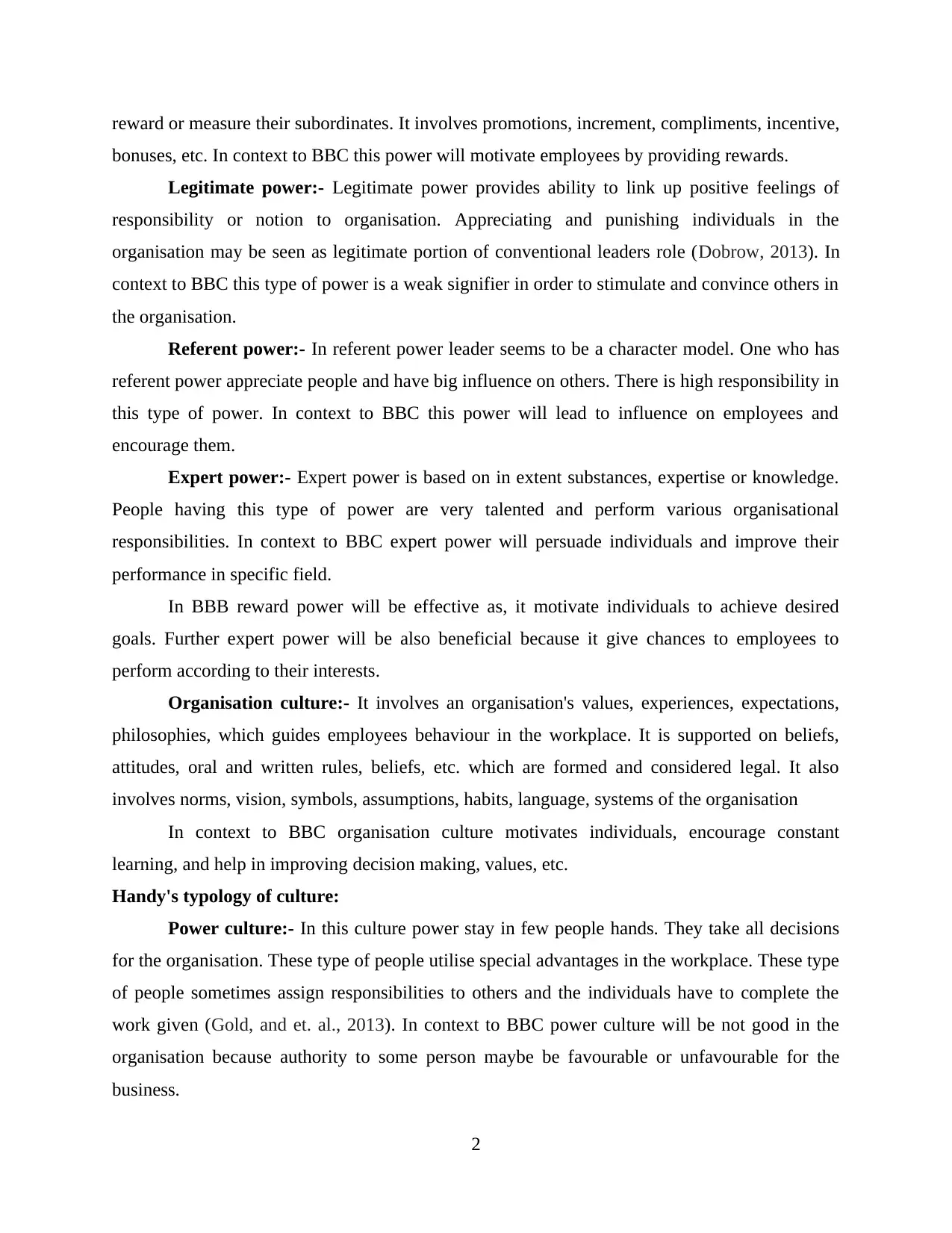
reward or measure their subordinates. It involves promotions, increment, compliments, incentive,
bonuses, etc. In context to BBC this power will motivate employees by providing rewards.
Legitimate power:- Legitimate power provides ability to link up positive feelings of
responsibility or notion to organisation. Appreciating and punishing individuals in the
organisation may be seen as legitimate portion of conventional leaders role (Dobrow, 2013). In
context to BBC this type of power is a weak signifier in order to stimulate and convince others in
the organisation.
Referent power:- In referent power leader seems to be a character model. One who has
referent power appreciate people and have big influence on others. There is high responsibility in
this type of power. In context to BBC this power will lead to influence on employees and
encourage them.
Expert power:- Expert power is based on in extent substances, expertise or knowledge.
People having this type of power are very talented and perform various organisational
responsibilities. In context to BBC expert power will persuade individuals and improve their
performance in specific field.
In BBB reward power will be effective as, it motivate individuals to achieve desired
goals. Further expert power will be also beneficial because it give chances to employees to
perform according to their interests.
Organisation culture:- It involves an organisation's values, experiences, expectations,
philosophies, which guides employees behaviour in the workplace. It is supported on beliefs,
attitudes, oral and written rules, beliefs, etc. which are formed and considered legal. It also
involves norms, vision, symbols, assumptions, habits, language, systems of the organisation
In context to BBC organisation culture motivates individuals, encourage constant
learning, and help in improving decision making, values, etc.
Handy's typology of culture:
Power culture:- In this culture power stay in few people hands. They take all decisions
for the organisation. These type of people utilise special advantages in the workplace. These type
of people sometimes assign responsibilities to others and the individuals have to complete the
work given (Gold, and et. al., 2013). In context to BBC power culture will be not good in the
organisation because authority to some person maybe be favourable or unfavourable for the
business.
2
bonuses, etc. In context to BBC this power will motivate employees by providing rewards.
Legitimate power:- Legitimate power provides ability to link up positive feelings of
responsibility or notion to organisation. Appreciating and punishing individuals in the
organisation may be seen as legitimate portion of conventional leaders role (Dobrow, 2013). In
context to BBC this type of power is a weak signifier in order to stimulate and convince others in
the organisation.
Referent power:- In referent power leader seems to be a character model. One who has
referent power appreciate people and have big influence on others. There is high responsibility in
this type of power. In context to BBC this power will lead to influence on employees and
encourage them.
Expert power:- Expert power is based on in extent substances, expertise or knowledge.
People having this type of power are very talented and perform various organisational
responsibilities. In context to BBC expert power will persuade individuals and improve their
performance in specific field.
In BBB reward power will be effective as, it motivate individuals to achieve desired
goals. Further expert power will be also beneficial because it give chances to employees to
perform according to their interests.
Organisation culture:- It involves an organisation's values, experiences, expectations,
philosophies, which guides employees behaviour in the workplace. It is supported on beliefs,
attitudes, oral and written rules, beliefs, etc. which are formed and considered legal. It also
involves norms, vision, symbols, assumptions, habits, language, systems of the organisation
In context to BBC organisation culture motivates individuals, encourage constant
learning, and help in improving decision making, values, etc.
Handy's typology of culture:
Power culture:- In this culture power stay in few people hands. They take all decisions
for the organisation. These type of people utilise special advantages in the workplace. These type
of people sometimes assign responsibilities to others and the individuals have to complete the
work given (Gold, and et. al., 2013). In context to BBC power culture will be not good in the
organisation because authority to some person maybe be favourable or unfavourable for the
business.
2
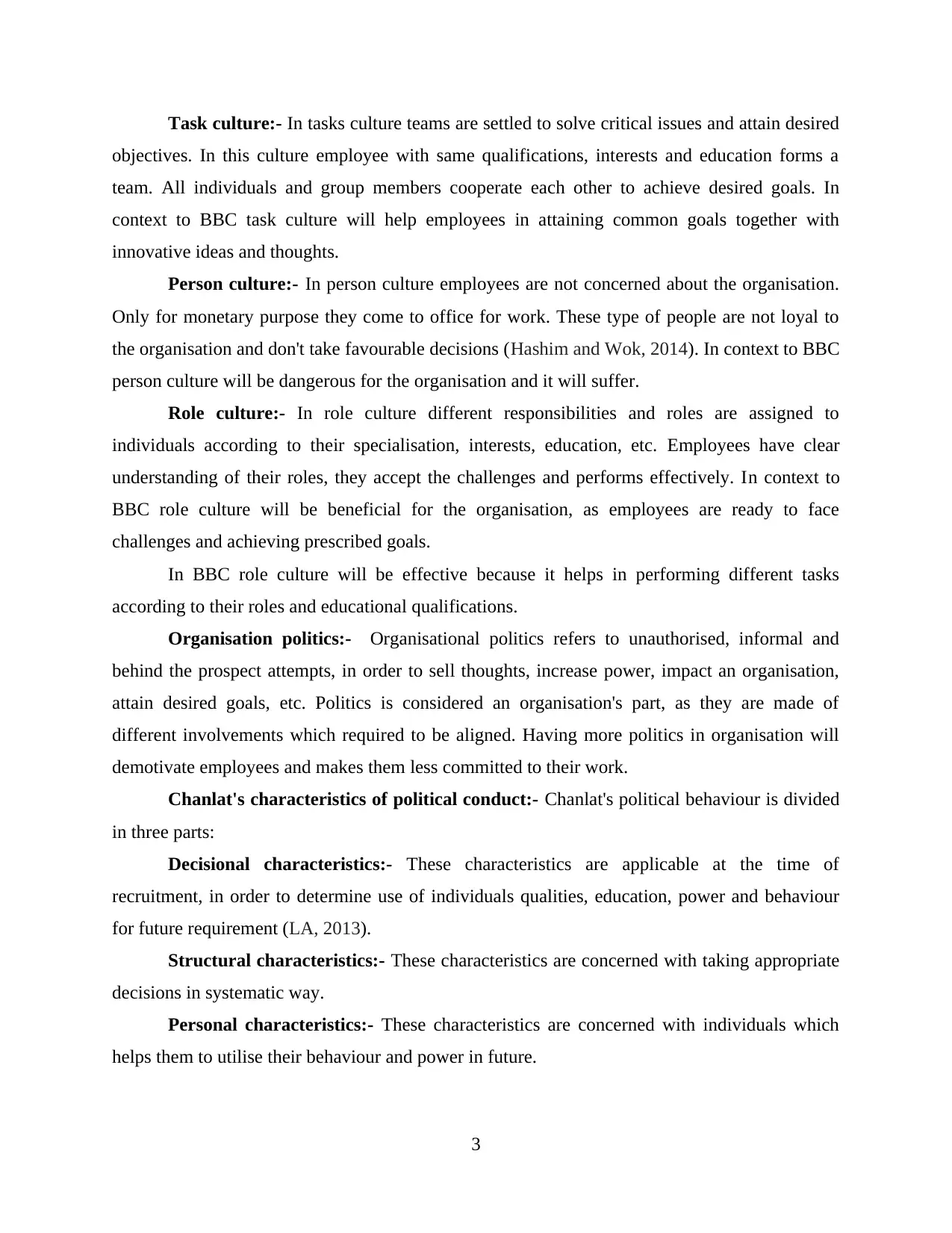
Task culture:- In tasks culture teams are settled to solve critical issues and attain desired
objectives. In this culture employee with same qualifications, interests and education forms a
team. All individuals and group members cooperate each other to achieve desired goals. In
context to BBC task culture will help employees in attaining common goals together with
innovative ideas and thoughts.
Person culture:- In person culture employees are not concerned about the organisation.
Only for monetary purpose they come to office for work. These type of people are not loyal to
the organisation and don't take favourable decisions (Hashim and Wok, 2014). In context to BBC
person culture will be dangerous for the organisation and it will suffer.
Role culture:- In role culture different responsibilities and roles are assigned to
individuals according to their specialisation, interests, education, etc. Employees have clear
understanding of their roles, they accept the challenges and performs effectively. In context to
BBC role culture will be beneficial for the organisation, as employees are ready to face
challenges and achieving prescribed goals.
In BBC role culture will be effective because it helps in performing different tasks
according to their roles and educational qualifications.
Organisation politics:- Organisational politics refers to unauthorised, informal and
behind the prospect attempts, in order to sell thoughts, increase power, impact an organisation,
attain desired goals, etc. Politics is considered an organisation's part, as they are made of
different involvements which required to be aligned. Having more politics in organisation will
demotivate employees and makes them less committed to their work.
Chanlat's characteristics of political conduct:- Chanlat's political behaviour is divided
in three parts:
Decisional characteristics:- These characteristics are applicable at the time of
recruitment, in order to determine use of individuals qualities, education, power and behaviour
for future requirement (LA, 2013).
Structural characteristics:- These characteristics are concerned with taking appropriate
decisions in systematic way.
Personal characteristics:- These characteristics are concerned with individuals which
helps them to utilise their behaviour and power in future.
3
objectives. In this culture employee with same qualifications, interests and education forms a
team. All individuals and group members cooperate each other to achieve desired goals. In
context to BBC task culture will help employees in attaining common goals together with
innovative ideas and thoughts.
Person culture:- In person culture employees are not concerned about the organisation.
Only for monetary purpose they come to office for work. These type of people are not loyal to
the organisation and don't take favourable decisions (Hashim and Wok, 2014). In context to BBC
person culture will be dangerous for the organisation and it will suffer.
Role culture:- In role culture different responsibilities and roles are assigned to
individuals according to their specialisation, interests, education, etc. Employees have clear
understanding of their roles, they accept the challenges and performs effectively. In context to
BBC role culture will be beneficial for the organisation, as employees are ready to face
challenges and achieving prescribed goals.
In BBC role culture will be effective because it helps in performing different tasks
according to their roles and educational qualifications.
Organisation politics:- Organisational politics refers to unauthorised, informal and
behind the prospect attempts, in order to sell thoughts, increase power, impact an organisation,
attain desired goals, etc. Politics is considered an organisation's part, as they are made of
different involvements which required to be aligned. Having more politics in organisation will
demotivate employees and makes them less committed to their work.
Chanlat's characteristics of political conduct:- Chanlat's political behaviour is divided
in three parts:
Decisional characteristics:- These characteristics are applicable at the time of
recruitment, in order to determine use of individuals qualities, education, power and behaviour
for future requirement (LA, 2013).
Structural characteristics:- These characteristics are concerned with taking appropriate
decisions in systematic way.
Personal characteristics:- These characteristics are concerned with individuals which
helps them to utilise their behaviour and power in future.
3
⊘ This is a preview!⊘
Do you want full access?
Subscribe today to unlock all pages.

Trusted by 1+ million students worldwide
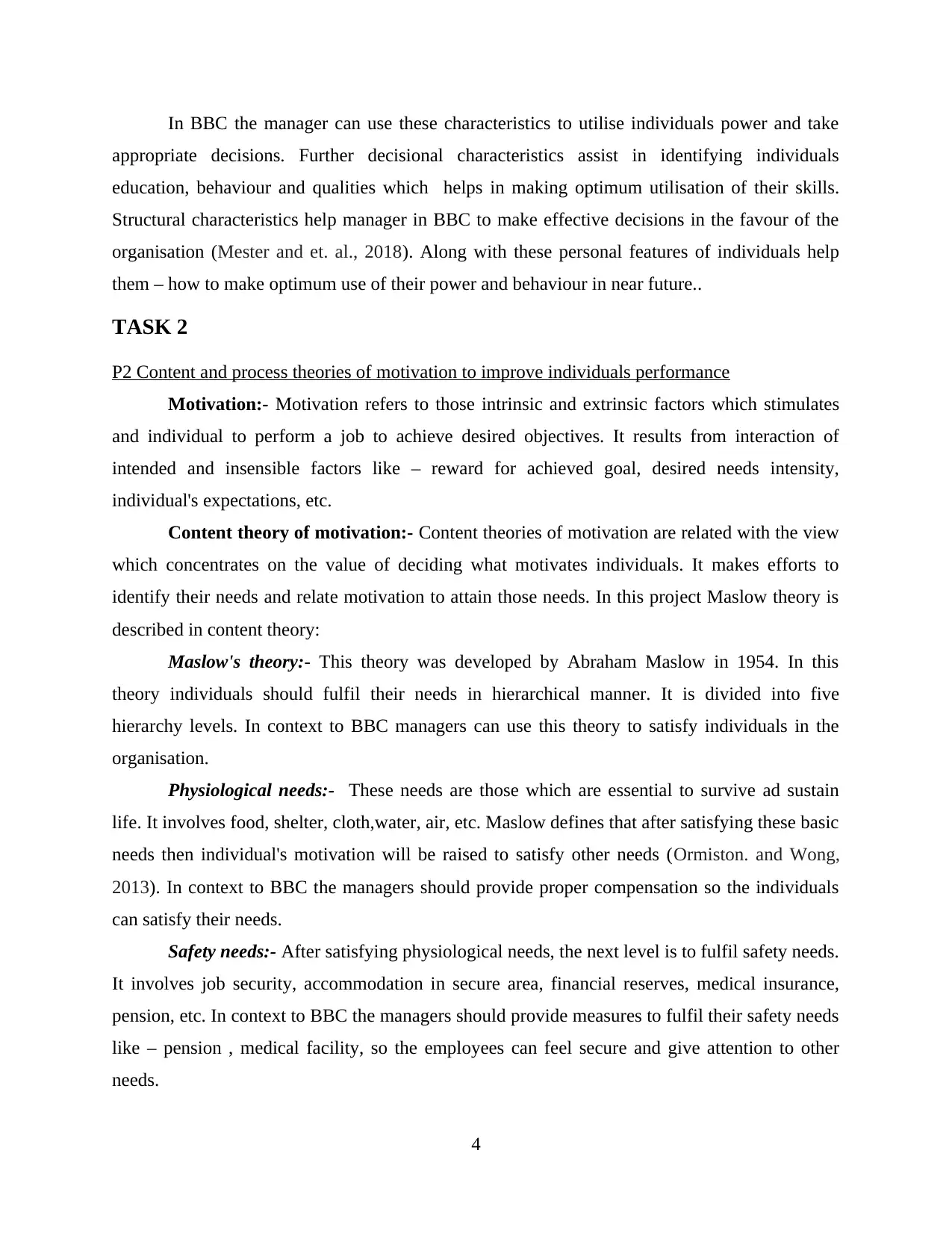
In BBC the manager can use these characteristics to utilise individuals power and take
appropriate decisions. Further decisional characteristics assist in identifying individuals
education, behaviour and qualities which helps in making optimum utilisation of their skills.
Structural characteristics help manager in BBC to make effective decisions in the favour of the
organisation (Mester and et. al., 2018). Along with these personal features of individuals help
them – how to make optimum use of their power and behaviour in near future..
TASK 2
P2 Content and process theories of motivation to improve individuals performance
Motivation:- Motivation refers to those intrinsic and extrinsic factors which stimulates
and individual to perform a job to achieve desired objectives. It results from interaction of
intended and insensible factors like – reward for achieved goal, desired needs intensity,
individual's expectations, etc.
Content theory of motivation:- Content theories of motivation are related with the view
which concentrates on the value of deciding what motivates individuals. It makes efforts to
identify their needs and relate motivation to attain those needs. In this project Maslow theory is
described in content theory:
Maslow's theory:- This theory was developed by Abraham Maslow in 1954. In this
theory individuals should fulfil their needs in hierarchical manner. It is divided into five
hierarchy levels. In context to BBC managers can use this theory to satisfy individuals in the
organisation.
Physiological needs:- These needs are those which are essential to survive ad sustain
life. It involves food, shelter, cloth,water, air, etc. Maslow defines that after satisfying these basic
needs then individual's motivation will be raised to satisfy other needs (Ormiston. and Wong,
2013). In context to BBC the managers should provide proper compensation so the individuals
can satisfy their needs.
Safety needs:- After satisfying physiological needs, the next level is to fulfil safety needs.
It involves job security, accommodation in secure area, financial reserves, medical insurance,
pension, etc. In context to BBC the managers should provide measures to fulfil their safety needs
like – pension , medical facility, so the employees can feel secure and give attention to other
needs.
4
appropriate decisions. Further decisional characteristics assist in identifying individuals
education, behaviour and qualities which helps in making optimum utilisation of their skills.
Structural characteristics help manager in BBC to make effective decisions in the favour of the
organisation (Mester and et. al., 2018). Along with these personal features of individuals help
them – how to make optimum use of their power and behaviour in near future..
TASK 2
P2 Content and process theories of motivation to improve individuals performance
Motivation:- Motivation refers to those intrinsic and extrinsic factors which stimulates
and individual to perform a job to achieve desired objectives. It results from interaction of
intended and insensible factors like – reward for achieved goal, desired needs intensity,
individual's expectations, etc.
Content theory of motivation:- Content theories of motivation are related with the view
which concentrates on the value of deciding what motivates individuals. It makes efforts to
identify their needs and relate motivation to attain those needs. In this project Maslow theory is
described in content theory:
Maslow's theory:- This theory was developed by Abraham Maslow in 1954. In this
theory individuals should fulfil their needs in hierarchical manner. It is divided into five
hierarchy levels. In context to BBC managers can use this theory to satisfy individuals in the
organisation.
Physiological needs:- These needs are those which are essential to survive ad sustain
life. It involves food, shelter, cloth,water, air, etc. Maslow defines that after satisfying these basic
needs then individual's motivation will be raised to satisfy other needs (Ormiston. and Wong,
2013). In context to BBC the managers should provide proper compensation so the individuals
can satisfy their needs.
Safety needs:- After satisfying physiological needs, the next level is to fulfil safety needs.
It involves job security, accommodation in secure area, financial reserves, medical insurance,
pension, etc. In context to BBC the managers should provide measures to fulfil their safety needs
like – pension , medical facility, so the employees can feel secure and give attention to other
needs.
4
Paraphrase This Document
Need a fresh take? Get an instant paraphrase of this document with our AI Paraphraser
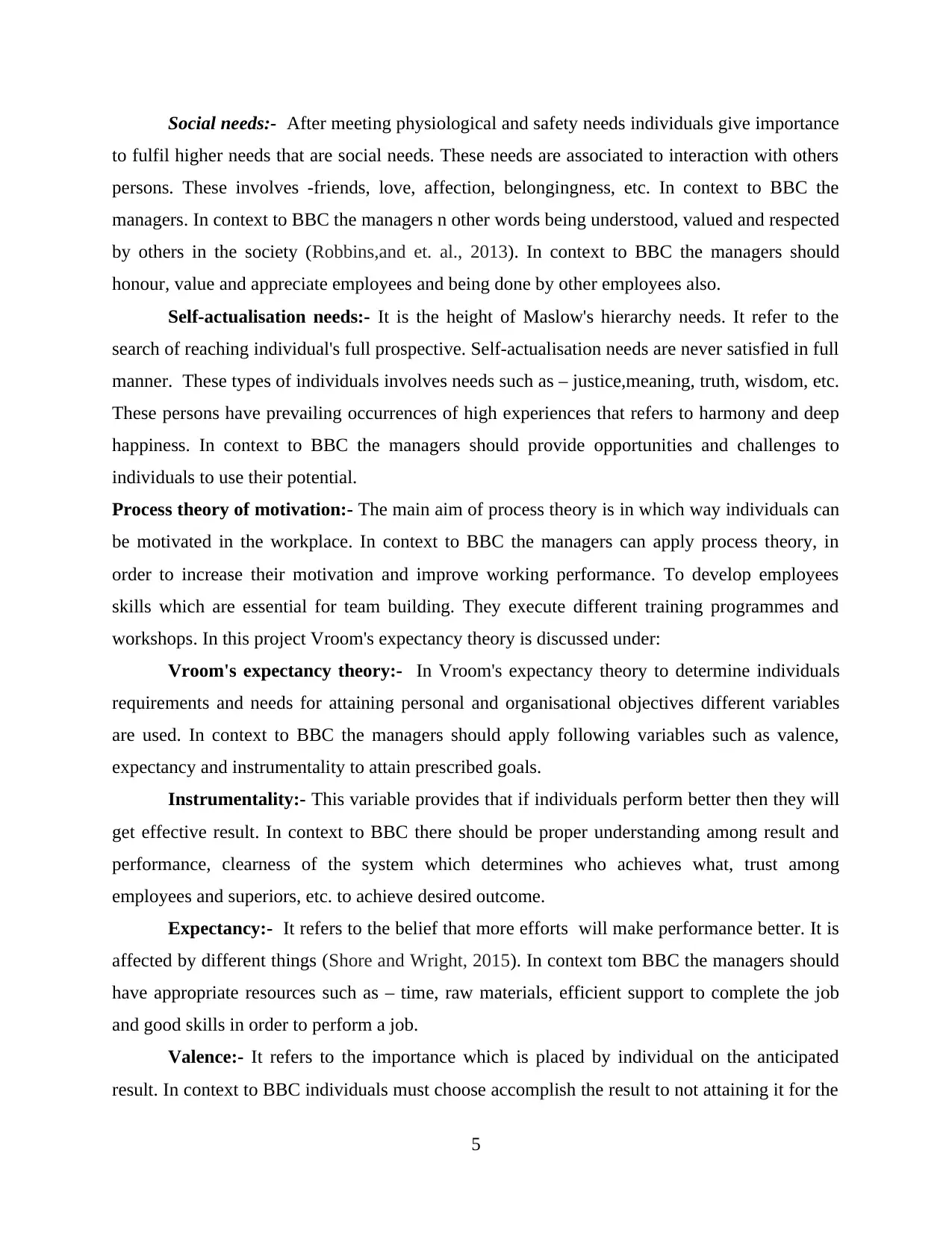
Social needs:- After meeting physiological and safety needs individuals give importance
to fulfil higher needs that are social needs. These needs are associated to interaction with others
persons. These involves -friends, love, affection, belongingness, etc. In context to BBC the
managers. In context to BBC the managers n other words being understood, valued and respected
by others in the society (Robbins,and et. al., 2013). In context to BBC the managers should
honour, value and appreciate employees and being done by other employees also.
Self-actualisation needs:- It is the height of Maslow's hierarchy needs. It refer to the
search of reaching individual's full prospective. Self-actualisation needs are never satisfied in full
manner. These types of individuals involves needs such as – justice,meaning, truth, wisdom, etc.
These persons have prevailing occurrences of high experiences that refers to harmony and deep
happiness. In context to BBC the managers should provide opportunities and challenges to
individuals to use their potential.
Process theory of motivation:- The main aim of process theory is in which way individuals can
be motivated in the workplace. In context to BBC the managers can apply process theory, in
order to increase their motivation and improve working performance. To develop employees
skills which are essential for team building. They execute different training programmes and
workshops. In this project Vroom's expectancy theory is discussed under:
Vroom's expectancy theory:- In Vroom's expectancy theory to determine individuals
requirements and needs for attaining personal and organisational objectives different variables
are used. In context to BBC the managers should apply following variables such as valence,
expectancy and instrumentality to attain prescribed goals.
Instrumentality:- This variable provides that if individuals perform better then they will
get effective result. In context to BBC there should be proper understanding among result and
performance, clearness of the system which determines who achieves what, trust among
employees and superiors, etc. to achieve desired outcome.
Expectancy:- It refers to the belief that more efforts will make performance better. It is
affected by different things (Shore and Wright, 2015). In context tom BBC the managers should
have appropriate resources such as – time, raw materials, efficient support to complete the job
and good skills in order to perform a job.
Valence:- It refers to the importance which is placed by individual on the anticipated
result. In context to BBC individuals must choose accomplish the result to not attaining it for the
5
to fulfil higher needs that are social needs. These needs are associated to interaction with others
persons. These involves -friends, love, affection, belongingness, etc. In context to BBC the
managers. In context to BBC the managers n other words being understood, valued and respected
by others in the society (Robbins,and et. al., 2013). In context to BBC the managers should
honour, value and appreciate employees and being done by other employees also.
Self-actualisation needs:- It is the height of Maslow's hierarchy needs. It refer to the
search of reaching individual's full prospective. Self-actualisation needs are never satisfied in full
manner. These types of individuals involves needs such as – justice,meaning, truth, wisdom, etc.
These persons have prevailing occurrences of high experiences that refers to harmony and deep
happiness. In context to BBC the managers should provide opportunities and challenges to
individuals to use their potential.
Process theory of motivation:- The main aim of process theory is in which way individuals can
be motivated in the workplace. In context to BBC the managers can apply process theory, in
order to increase their motivation and improve working performance. To develop employees
skills which are essential for team building. They execute different training programmes and
workshops. In this project Vroom's expectancy theory is discussed under:
Vroom's expectancy theory:- In Vroom's expectancy theory to determine individuals
requirements and needs for attaining personal and organisational objectives different variables
are used. In context to BBC the managers should apply following variables such as valence,
expectancy and instrumentality to attain prescribed goals.
Instrumentality:- This variable provides that if individuals perform better then they will
get effective result. In context to BBC there should be proper understanding among result and
performance, clearness of the system which determines who achieves what, trust among
employees and superiors, etc. to achieve desired outcome.
Expectancy:- It refers to the belief that more efforts will make performance better. It is
affected by different things (Shore and Wright, 2015). In context tom BBC the managers should
have appropriate resources such as – time, raw materials, efficient support to complete the job
and good skills in order to perform a job.
Valence:- It refers to the importance which is placed by individual on the anticipated
result. In context to BBC individuals must choose accomplish the result to not attaining it for the
5
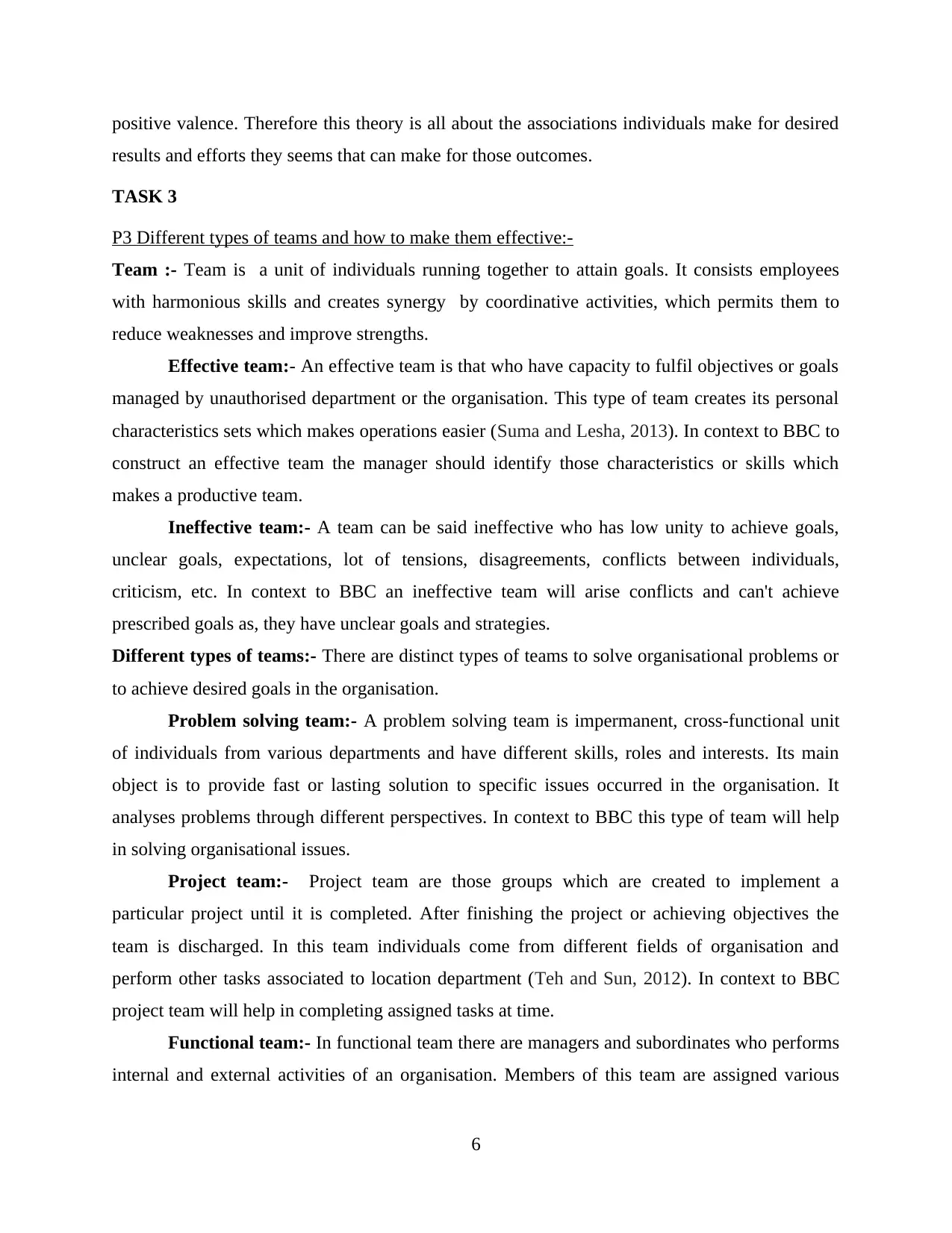
positive valence. Therefore this theory is all about the associations individuals make for desired
results and efforts they seems that can make for those outcomes.
TASK 3
P3 Different types of teams and how to make them effective:-
Team :- Team is a unit of individuals running together to attain goals. It consists employees
with harmonious skills and creates synergy by coordinative activities, which permits them to
reduce weaknesses and improve strengths.
Effective team:- An effective team is that who have capacity to fulfil objectives or goals
managed by unauthorised department or the organisation. This type of team creates its personal
characteristics sets which makes operations easier (Suma and Lesha, 2013). In context to BBC to
construct an effective team the manager should identify those characteristics or skills which
makes a productive team.
Ineffective team:- A team can be said ineffective who has low unity to achieve goals,
unclear goals, expectations, lot of tensions, disagreements, conflicts between individuals,
criticism, etc. In context to BBC an ineffective team will arise conflicts and can't achieve
prescribed goals as, they have unclear goals and strategies.
Different types of teams:- There are distinct types of teams to solve organisational problems or
to achieve desired goals in the organisation.
Problem solving team:- A problem solving team is impermanent, cross-functional unit
of individuals from various departments and have different skills, roles and interests. Its main
object is to provide fast or lasting solution to specific issues occurred in the organisation. It
analyses problems through different perspectives. In context to BBC this type of team will help
in solving organisational issues.
Project team:- Project team are those groups which are created to implement a
particular project until it is completed. After finishing the project or achieving objectives the
team is discharged. In this team individuals come from different fields of organisation and
perform other tasks associated to location department (Teh and Sun, 2012). In context to BBC
project team will help in completing assigned tasks at time.
Functional team:- In functional team there are managers and subordinates who performs
internal and external activities of an organisation. Members of this team are assigned various
6
results and efforts they seems that can make for those outcomes.
TASK 3
P3 Different types of teams and how to make them effective:-
Team :- Team is a unit of individuals running together to attain goals. It consists employees
with harmonious skills and creates synergy by coordinative activities, which permits them to
reduce weaknesses and improve strengths.
Effective team:- An effective team is that who have capacity to fulfil objectives or goals
managed by unauthorised department or the organisation. This type of team creates its personal
characteristics sets which makes operations easier (Suma and Lesha, 2013). In context to BBC to
construct an effective team the manager should identify those characteristics or skills which
makes a productive team.
Ineffective team:- A team can be said ineffective who has low unity to achieve goals,
unclear goals, expectations, lot of tensions, disagreements, conflicts between individuals,
criticism, etc. In context to BBC an ineffective team will arise conflicts and can't achieve
prescribed goals as, they have unclear goals and strategies.
Different types of teams:- There are distinct types of teams to solve organisational problems or
to achieve desired goals in the organisation.
Problem solving team:- A problem solving team is impermanent, cross-functional unit
of individuals from various departments and have different skills, roles and interests. Its main
object is to provide fast or lasting solution to specific issues occurred in the organisation. It
analyses problems through different perspectives. In context to BBC this type of team will help
in solving organisational issues.
Project team:- Project team are those groups which are created to implement a
particular project until it is completed. After finishing the project or achieving objectives the
team is discharged. In this team individuals come from different fields of organisation and
perform other tasks associated to location department (Teh and Sun, 2012). In context to BBC
project team will help in completing assigned tasks at time.
Functional team:- In functional team there are managers and subordinates who performs
internal and external activities of an organisation. Members of this team are assigned various
6
⊘ This is a preview!⊘
Do you want full access?
Subscribe today to unlock all pages.

Trusted by 1+ million students worldwide
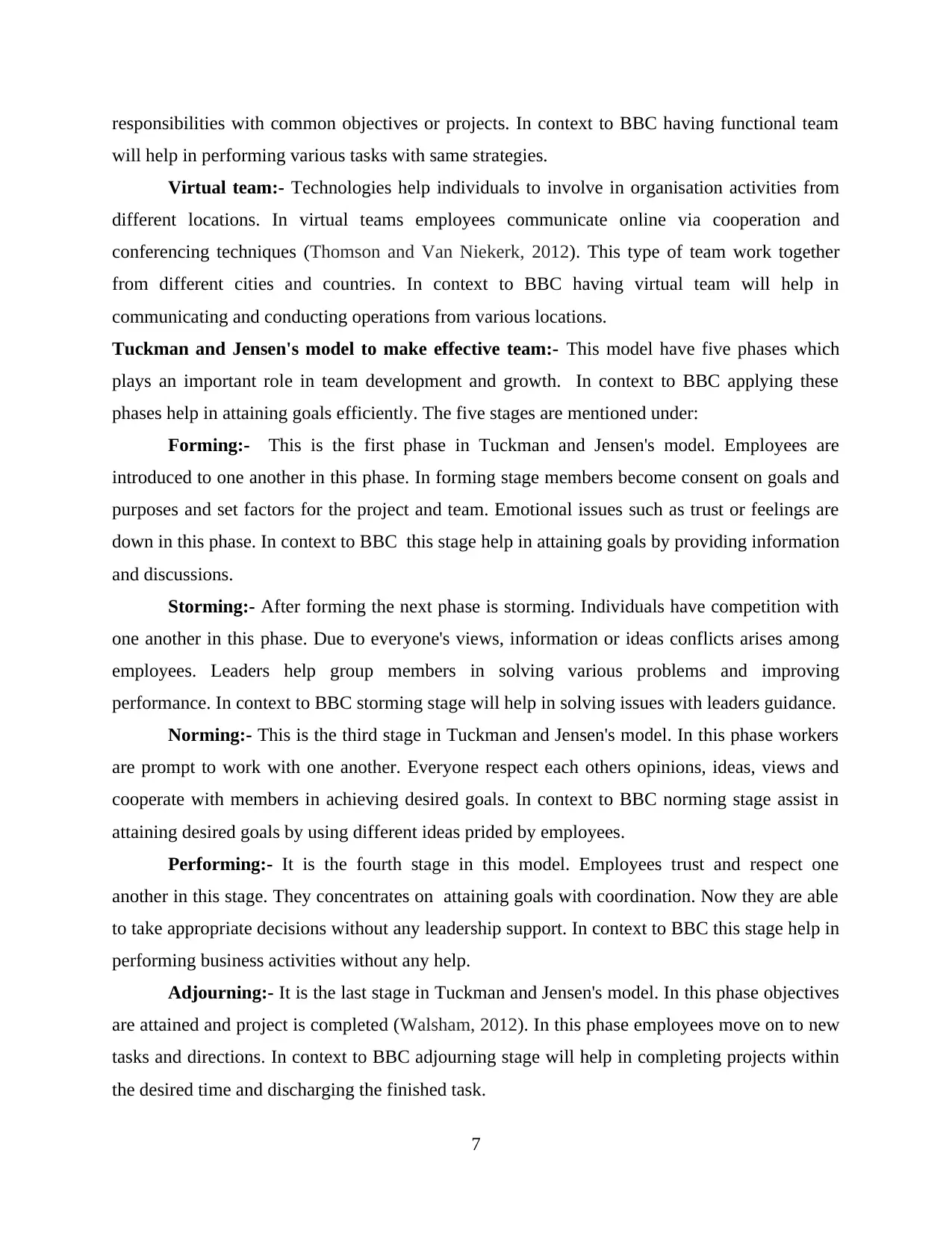
responsibilities with common objectives or projects. In context to BBC having functional team
will help in performing various tasks with same strategies.
Virtual team:- Technologies help individuals to involve in organisation activities from
different locations. In virtual teams employees communicate online via cooperation and
conferencing techniques (Thomson and Van Niekerk, 2012). This type of team work together
from different cities and countries. In context to BBC having virtual team will help in
communicating and conducting operations from various locations.
Tuckman and Jensen's model to make effective team:- This model have five phases which
plays an important role in team development and growth. In context to BBC applying these
phases help in attaining goals efficiently. The five stages are mentioned under:
Forming:- This is the first phase in Tuckman and Jensen's model. Employees are
introduced to one another in this phase. In forming stage members become consent on goals and
purposes and set factors for the project and team. Emotional issues such as trust or feelings are
down in this phase. In context to BBC this stage help in attaining goals by providing information
and discussions.
Storming:- After forming the next phase is storming. Individuals have competition with
one another in this phase. Due to everyone's views, information or ideas conflicts arises among
employees. Leaders help group members in solving various problems and improving
performance. In context to BBC storming stage will help in solving issues with leaders guidance.
Norming:- This is the third stage in Tuckman and Jensen's model. In this phase workers
are prompt to work with one another. Everyone respect each others opinions, ideas, views and
cooperate with members in achieving desired goals. In context to BBC norming stage assist in
attaining desired goals by using different ideas prided by employees.
Performing:- It is the fourth stage in this model. Employees trust and respect one
another in this stage. They concentrates on attaining goals with coordination. Now they are able
to take appropriate decisions without any leadership support. In context to BBC this stage help in
performing business activities without any help.
Adjourning:- It is the last stage in Tuckman and Jensen's model. In this phase objectives
are attained and project is completed (Walsham, 2012). In this phase employees move on to new
tasks and directions. In context to BBC adjourning stage will help in completing projects within
the desired time and discharging the finished task.
7
will help in performing various tasks with same strategies.
Virtual team:- Technologies help individuals to involve in organisation activities from
different locations. In virtual teams employees communicate online via cooperation and
conferencing techniques (Thomson and Van Niekerk, 2012). This type of team work together
from different cities and countries. In context to BBC having virtual team will help in
communicating and conducting operations from various locations.
Tuckman and Jensen's model to make effective team:- This model have five phases which
plays an important role in team development and growth. In context to BBC applying these
phases help in attaining goals efficiently. The five stages are mentioned under:
Forming:- This is the first phase in Tuckman and Jensen's model. Employees are
introduced to one another in this phase. In forming stage members become consent on goals and
purposes and set factors for the project and team. Emotional issues such as trust or feelings are
down in this phase. In context to BBC this stage help in attaining goals by providing information
and discussions.
Storming:- After forming the next phase is storming. Individuals have competition with
one another in this phase. Due to everyone's views, information or ideas conflicts arises among
employees. Leaders help group members in solving various problems and improving
performance. In context to BBC storming stage will help in solving issues with leaders guidance.
Norming:- This is the third stage in Tuckman and Jensen's model. In this phase workers
are prompt to work with one another. Everyone respect each others opinions, ideas, views and
cooperate with members in achieving desired goals. In context to BBC norming stage assist in
attaining desired goals by using different ideas prided by employees.
Performing:- It is the fourth stage in this model. Employees trust and respect one
another in this stage. They concentrates on attaining goals with coordination. Now they are able
to take appropriate decisions without any leadership support. In context to BBC this stage help in
performing business activities without any help.
Adjourning:- It is the last stage in Tuckman and Jensen's model. In this phase objectives
are attained and project is completed (Walsham, 2012). In this phase employees move on to new
tasks and directions. In context to BBC adjourning stage will help in completing projects within
the desired time and discharging the finished task.
7
Paraphrase This Document
Need a fresh take? Get an instant paraphrase of this document with our AI Paraphraser
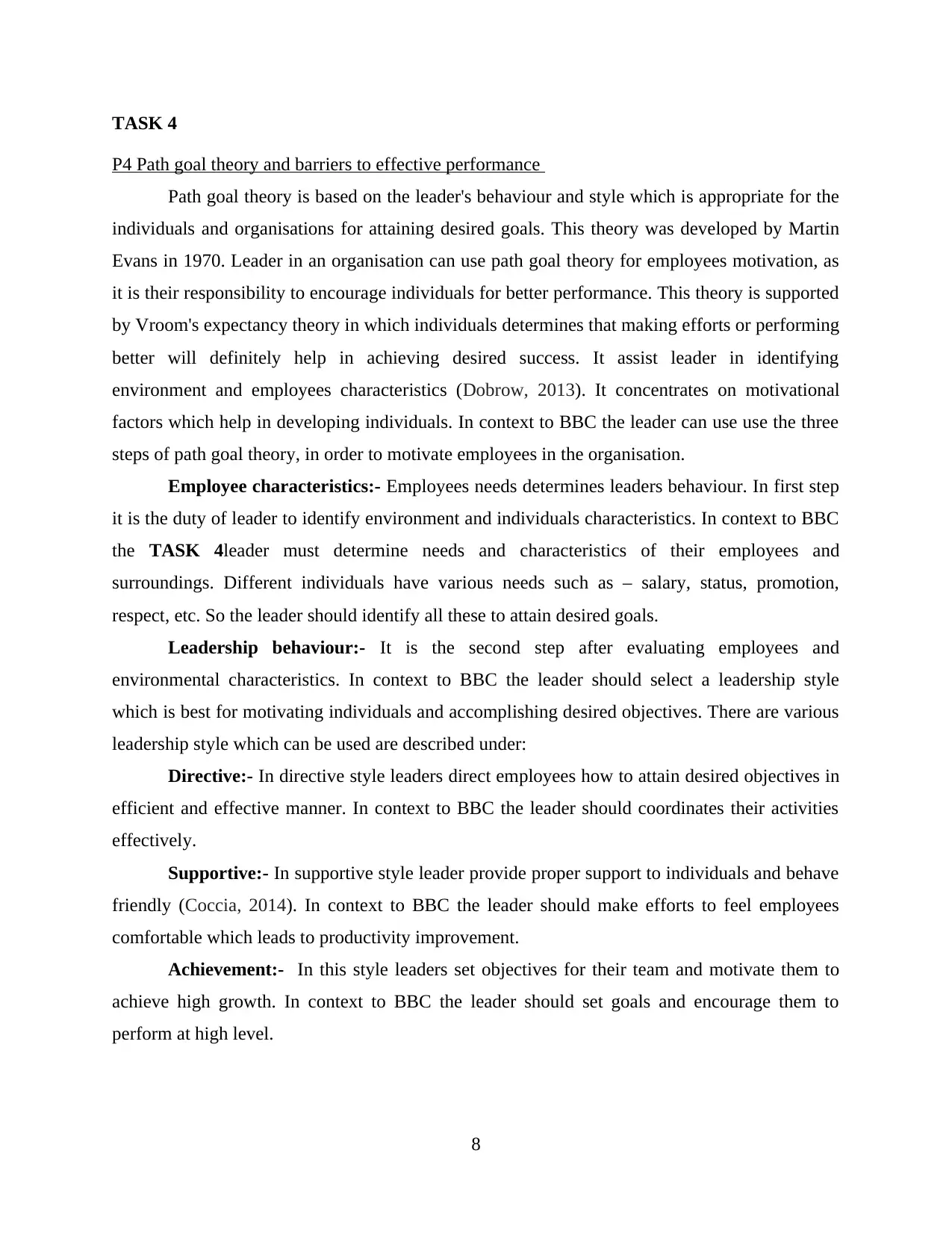
TASK 4
P4 Path goal theory and barriers to effective performance
Path goal theory is based on the leader's behaviour and style which is appropriate for the
individuals and organisations for attaining desired goals. This theory was developed by Martin
Evans in 1970. Leader in an organisation can use path goal theory for employees motivation, as
it is their responsibility to encourage individuals for better performance. This theory is supported
by Vroom's expectancy theory in which individuals determines that making efforts or performing
better will definitely help in achieving desired success. It assist leader in identifying
environment and employees characteristics (Dobrow, 2013). It concentrates on motivational
factors which help in developing individuals. In context to BBC the leader can use use the three
steps of path goal theory, in order to motivate employees in the organisation.
Employee characteristics:- Employees needs determines leaders behaviour. In first step
it is the duty of leader to identify environment and individuals characteristics. In context to BBC
the TASK 4leader must determine needs and characteristics of their employees and
surroundings. Different individuals have various needs such as – salary, status, promotion,
respect, etc. So the leader should identify all these to attain desired goals.
Leadership behaviour:- It is the second step after evaluating employees and
environmental characteristics. In context to BBC the leader should select a leadership style
which is best for motivating individuals and accomplishing desired objectives. There are various
leadership style which can be used are described under:
Directive:- In directive style leaders direct employees how to attain desired objectives in
efficient and effective manner. In context to BBC the leader should coordinates their activities
effectively.
Supportive:- In supportive style leader provide proper support to individuals and behave
friendly (Coccia, 2014). In context to BBC the leader should make efforts to feel employees
comfortable which leads to productivity improvement.
Achievement:- In this style leaders set objectives for their team and motivate them to
achieve high growth. In context to BBC the leader should set goals and encourage them to
perform at high level.
8
P4 Path goal theory and barriers to effective performance
Path goal theory is based on the leader's behaviour and style which is appropriate for the
individuals and organisations for attaining desired goals. This theory was developed by Martin
Evans in 1970. Leader in an organisation can use path goal theory for employees motivation, as
it is their responsibility to encourage individuals for better performance. This theory is supported
by Vroom's expectancy theory in which individuals determines that making efforts or performing
better will definitely help in achieving desired success. It assist leader in identifying
environment and employees characteristics (Dobrow, 2013). It concentrates on motivational
factors which help in developing individuals. In context to BBC the leader can use use the three
steps of path goal theory, in order to motivate employees in the organisation.
Employee characteristics:- Employees needs determines leaders behaviour. In first step
it is the duty of leader to identify environment and individuals characteristics. In context to BBC
the TASK 4leader must determine needs and characteristics of their employees and
surroundings. Different individuals have various needs such as – salary, status, promotion,
respect, etc. So the leader should identify all these to attain desired goals.
Leadership behaviour:- It is the second step after evaluating employees and
environmental characteristics. In context to BBC the leader should select a leadership style
which is best for motivating individuals and accomplishing desired objectives. There are various
leadership style which can be used are described under:
Directive:- In directive style leaders direct employees how to attain desired objectives in
efficient and effective manner. In context to BBC the leader should coordinates their activities
effectively.
Supportive:- In supportive style leader provide proper support to individuals and behave
friendly (Coccia, 2014). In context to BBC the leader should make efforts to feel employees
comfortable which leads to productivity improvement.
Achievement:- In this style leaders set objectives for their team and motivate them to
achieve high growth. In context to BBC the leader should set goals and encourage them to
perform at high level.
8
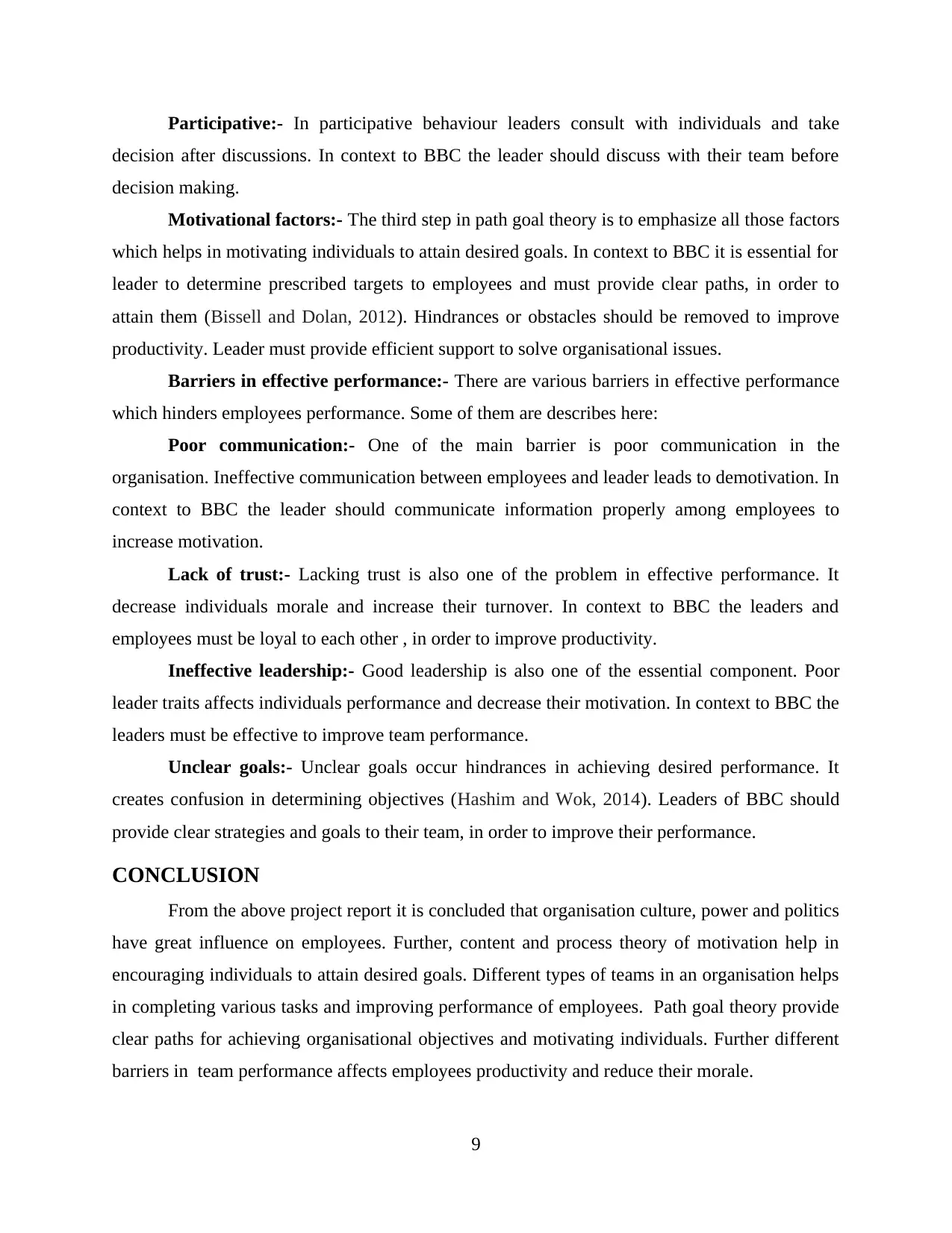
Participative:- In participative behaviour leaders consult with individuals and take
decision after discussions. In context to BBC the leader should discuss with their team before
decision making.
Motivational factors:- The third step in path goal theory is to emphasize all those factors
which helps in motivating individuals to attain desired goals. In context to BBC it is essential for
leader to determine prescribed targets to employees and must provide clear paths, in order to
attain them (Bissell and Dolan, 2012). Hindrances or obstacles should be removed to improve
productivity. Leader must provide efficient support to solve organisational issues.
Barriers in effective performance:- There are various barriers in effective performance
which hinders employees performance. Some of them are describes here:
Poor communication:- One of the main barrier is poor communication in the
organisation. Ineffective communication between employees and leader leads to demotivation. In
context to BBC the leader should communicate information properly among employees to
increase motivation.
Lack of trust:- Lacking trust is also one of the problem in effective performance. It
decrease individuals morale and increase their turnover. In context to BBC the leaders and
employees must be loyal to each other , in order to improve productivity.
Ineffective leadership:- Good leadership is also one of the essential component. Poor
leader traits affects individuals performance and decrease their motivation. In context to BBC the
leaders must be effective to improve team performance.
Unclear goals:- Unclear goals occur hindrances in achieving desired performance. It
creates confusion in determining objectives (Hashim and Wok, 2014). Leaders of BBC should
provide clear strategies and goals to their team, in order to improve their performance.
CONCLUSION
From the above project report it is concluded that organisation culture, power and politics
have great influence on employees. Further, content and process theory of motivation help in
encouraging individuals to attain desired goals. Different types of teams in an organisation helps
in completing various tasks and improving performance of employees. Path goal theory provide
clear paths for achieving organisational objectives and motivating individuals. Further different
barriers in team performance affects employees productivity and reduce their morale.
9
decision after discussions. In context to BBC the leader should discuss with their team before
decision making.
Motivational factors:- The third step in path goal theory is to emphasize all those factors
which helps in motivating individuals to attain desired goals. In context to BBC it is essential for
leader to determine prescribed targets to employees and must provide clear paths, in order to
attain them (Bissell and Dolan, 2012). Hindrances or obstacles should be removed to improve
productivity. Leader must provide efficient support to solve organisational issues.
Barriers in effective performance:- There are various barriers in effective performance
which hinders employees performance. Some of them are describes here:
Poor communication:- One of the main barrier is poor communication in the
organisation. Ineffective communication between employees and leader leads to demotivation. In
context to BBC the leader should communicate information properly among employees to
increase motivation.
Lack of trust:- Lacking trust is also one of the problem in effective performance. It
decrease individuals morale and increase their turnover. In context to BBC the leaders and
employees must be loyal to each other , in order to improve productivity.
Ineffective leadership:- Good leadership is also one of the essential component. Poor
leader traits affects individuals performance and decrease their motivation. In context to BBC the
leaders must be effective to improve team performance.
Unclear goals:- Unclear goals occur hindrances in achieving desired performance. It
creates confusion in determining objectives (Hashim and Wok, 2014). Leaders of BBC should
provide clear strategies and goals to their team, in order to improve their performance.
CONCLUSION
From the above project report it is concluded that organisation culture, power and politics
have great influence on employees. Further, content and process theory of motivation help in
encouraging individuals to attain desired goals. Different types of teams in an organisation helps
in completing various tasks and improving performance of employees. Path goal theory provide
clear paths for achieving organisational objectives and motivating individuals. Further different
barriers in team performance affects employees productivity and reduce their morale.
9
⊘ This is a preview!⊘
Do you want full access?
Subscribe today to unlock all pages.

Trusted by 1+ million students worldwide
1 out of 13
Related Documents
Your All-in-One AI-Powered Toolkit for Academic Success.
+13062052269
info@desklib.com
Available 24*7 on WhatsApp / Email
![[object Object]](/_next/static/media/star-bottom.7253800d.svg)
Unlock your academic potential
Copyright © 2020–2026 A2Z Services. All Rights Reserved. Developed and managed by ZUCOL.





